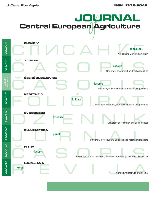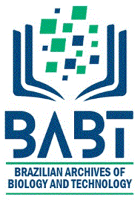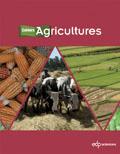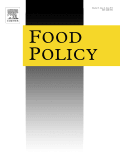
Nature Food
Scope & Guideline
Fostering Collaboration in Food and Agricultural Research.
Introduction
Aims and Scopes
- Sustainable Food Production:
Research focusing on practices and technologies that enhance the sustainability of food production systems, including innovations in agriculture, aquaculture, and food processing. - Food Security and Nutrition:
Studies addressing the complex interrelations between food availability, access, and utilization, with an emphasis on improving dietary quality and combating malnutrition. - Climate Change and Food Systems:
Investigations into the impacts of climate change on food systems, including adaptation strategies and mitigation practices to reduce greenhouse gas emissions from food production. - Innovative Food Technologies:
Exploration of cutting-edge technologies such as biotechnology, artificial intelligence, and digital innovations that contribute to more efficient and sustainable food systems. - Socio-Economic Aspects of Food Systems:
Analysis of the economic, social, and policy dimensions of food systems, including the role of governance, consumer behavior, and cultural factors in shaping food practices. - Ecosystem Services and Biodiversity:
Research on the interactions between food systems and ecosystems, focusing on biodiversity conservation, ecosystem services, and the sustainable management of natural resources.
Trending and Emerging
- Artificial Intelligence in Food Production:
The application of AI technologies in optimizing agricultural practices, resource management, and supply chain efficiencies is gaining traction, aiming to enhance productivity and sustainability. - Regenerative Agriculture:
An increasing focus on regenerative practices that restore soil health, enhance biodiversity, and improve carbon sequestration is evident, aligning with global sustainability goals. - Climate Resilience and Adaptation Strategies:
Research is trending towards identifying and implementing adaptation strategies for food systems to cope with climate change, ensuring food security under changing environmental conditions. - Plant-Based and Alternative Proteins:
The shift towards plant-based diets and the exploration of alternative protein sources, including lab-grown meats and insect proteins, is increasingly prominent, driven by health and environmental concerns. - Integrated Food Systems Approaches:
A holistic perspective is emerging, emphasizing the interconnectedness of food systems, health, and environmental sustainability, leading to innovative strategies for comprehensive food system transformations. - Public Health and Food Policy:
There is a growing emphasis on the links between food systems, public health outcomes, and policy interventions, highlighting the need for integrated strategies to tackle health disparities and nutritional challenges.
Declining or Waning
- Traditional Agricultural Practices:
There has been a noticeable decline in research focused on conventional agricultural methods as the emphasis shifts towards innovative, sustainable practices and technologies. - Animal-Sourced Food Production:
Although still relevant, studies specifically centered on traditional livestock farming and its impacts have decreased as the focus shifts to plant-based diets and alternative protein sources. - Food Waste Management:
Research specifically targeting food waste reduction strategies has waned, with a growing emphasis on holistic food systems approaches that encompass waste as part of the broader sustainability narrative. - Regional Food Systems:
While regional food system studies were previously prominent, there is now a trend towards global analyses that consider interconnectedness and transnational food supply chains. - Food Fortification Programs:
Research on traditional food fortification strategies has seen reduced focus, as newer methods and holistic approaches to nutrition security gain traction.
Similar Journals

Journal of Central European Agriculture
Fostering Innovation in Agronomy and Animal ScienceThe Journal of Central European Agriculture, with ISSN 1332-9049 and E-ISSN 1332-9049, is an esteemed platform published by UNIV ZAGREB, FAC AGRICULTURE that caters to the dynamic fields of agronomy, crop science, and animal science. Since its establishment in 2000, this Open Access journal has played a crucial role in disseminating critical research findings while fostering collaboration among academics, researchers, and professionals within the agricultural community. The journal, which is based in the heart of Croatia, spans a rich history of scholarship, with its content available for free to readers and contributors alike. As reflected in its current standings, the journal has achieved a Quartile 3 ranking in Agronomy and Crop Science and Quartile 4 in Animal Science and Zoology for the year 2023, indicating its growing influence within these disciplines. With Scopus ranks placing it in the 32nd percentile among its peers, the Journal of Central European Agriculture is committed to advancing agricultural sciences not only in Central Europe but globally as it prepares for its converged years from 2007 through 2024. This journal serves as a vital resource for innovative research, practical applications, and a deeper understanding of agricultural challenges and solutions.

AGRICULTURAL SYSTEMS
Pioneering research at the intersection of agronomy and animal science.AGRICULTURAL SYSTEMS, published by Elsevier Science Ltd, is a premier academic journal that serves as a leading platform for innovative research in the fields of agronomy, animal science, and related biological sciences. With a prestigious impact factor reflected in its Q1 ranking in both Agronomy and Crop Science, as well as Animal Science and Zoology, the journal showcases cutting-edge studies and developments from 1976 through 2024. Located in the United Kingdom, the journal features a robust selection of articles that emphasize the integration of agricultural systems, enhancing global agricultural productivity and sustainability. Although it does not currently offer open access options, AGRICULTURAL SYSTEMS maintains an excellent reputation amongst scholars, epitomized by its high rankings in Scopus, placing it in the top 1% of journals in its categories. This makes it an essential resource for researchers, professionals, and students dedicated to advancing knowledge and practice within the agricultural sector.

Food Security
Championing Research to Combat Global Food InsecurityFood Security is a premier academic journal dedicated to advancing knowledge and fostering dialogue surrounding the critical issues of food security and sustainability in a rapidly changing world. Published by Springer, this journal has established itself as a leading voice in the fields of Agronomy, Crop Science, Development, and Food Science, reflected in its impressive Q1 quartile rankings across these disciplines for 2023. With an impact factor showcasing its significant influence, Food Security is ranked in the top echelon of its domain, with notable positions in Scopus indices (Rank #7 in Agronomy and Crop Science, Rank #6 in Development, and Rank #13 in Food Science). Spanning articles from 2010 to 2024, the journal serves as a critical resource for researchers, professionals, and students seeking to address the complex interplay of agricultural practices, socio-economic dynamics, and environmental factors that contribute to food availability and accessibility on a global scale. While primarily subscription-based, Food Security ensures that its audience remains engaged with the latest research, policy discussions, and innovative solutions to combat food insecurity worldwide.

Revista de la Facultad de Agronomia de la Universidad del Zulia
Exploring the Future of Food and Agriculture in Latin AmericaWelcome to the Revista de la Facultad de Agronomia de la Universidad del Zulia, a key publication in the fields of Agronomy, Animal Science, Food Science, and Plant Science. Published by the Facultad de Agronomía, Universidad del Zulia, this journal aims to foster academic dialogue and disseminate impactful research that advances knowledge and practice within these disciplines. Operating under the ISSN 0378-7818 and E-ISSN 2477-9407, this journal offers a platform for both emerging and established scholars to share their discoveries and innovations. Despite its challenges, as reflected in its Q4 ranking across multiple categories in 2023, it remains a vital resource for the Venezuelan scientific community and beyond. Readers will benefit from a diverse array of studies and discussions that address contemporary issues in agriculture and related fields, helping inform best practices and policy. Engage with cutting-edge research from Venezuela and contribute to the development of agronomic sciences in the region.

Agricultural and Food Economics
Empowering scholars with cutting-edge findings in food economics.Agricultural and Food Economics is a leading journal published by SPRINGERNATURE, dedicated to the advancement of research in the interconnected fields of agriculture, food systems, and economic analysis. Established in 2013 and operating under an Open Access model, this journal serves as a vital platform for scholars and practitioners to disseminate innovative findings and insights that influence policy and practice. With a notable impact reflected in its 2023 quartile rankings—Q1 in Agricultural and Biological Sciences (miscellaneous), Q2 in Economics and Econometrics, and Q1 in Food Science—this journal is recognized for its rigorous scholarly output. It ranks among the top resources in its domain, with Scopus ranks placing it in the 88th percentile for Agricultural and Biological Sciences and the 79th percentile for Economics. The journal covers a broad spectrum of topics, including sustainable agricultural practices, the dynamics of food markets, and the economic implications of food policies. Researchers, professionals, and students alike will find valuable insights and comprehensive analyses that contribute to the ever-evolving discourse on food and agriculture.

Poljoprivreda
Connecting researchers to revolutionize farming practices.Poljoprivreda is a distinguished open-access journal dedicated to the field of agronomy and crop science, published by the FAC Agriculture Osijek in Croatia. Since its inception in 2000, the journal has been committed to disseminating high-quality research that informs both academic and practical advancements in agriculture. With an ISSN of 1330-7142 and an E-ISSN of 1848-8080, Poljoprivreda provides a vital platform for researchers, professionals, and students to engage with the latest findings and methodologies in agronomy, contributing significantly to the enhancement of agricultural practices in Croatia and beyond. Although currently ranked in the 22nd percentile within its category according to Scopus, the journal aspires to elevate its standing by welcoming innovative research that addresses contemporary challenges within the agricultural sciences. By fostering open access since 2000, Poljoprivreda ensures that its scholarly content is freely available, promoting wider dissemination and collaborative opportunities among researchers globally.

BRAZILIAN ARCHIVES OF BIOLOGY AND TECHNOLOGY
Empowering scholars with a platform for groundbreaking discoveries.BRAZILIAN ARCHIVES OF BIOLOGY AND TECHNOLOGY is a distinguished peer-reviewed journal that has become an essential resource in the field of multidisciplinary research since its inception in 1998. Published by the Instituto de Tecnologia do Paraná, the journal has successfully transitioned to an Open Access model since 2001, promoting widespread dissemination of knowledge across global research communities. With an impressive Q2 ranking and a Scopus percentile of 66th in the discipline, it ranks #58 out of 171 in its category, solidifying its influence and relevance in advancing scientific dialogue. The journal embraces diverse topics within biology and technology, encouraging interdisciplinary collaboration and innovation. Scholars, professionals, and students will find an invaluable platform for sharing groundbreaking research, emerging ideas, and critical reviews in a vibrant academic environment. For more information, please visit our website.

CAHIERS AGRICULTURES
Connecting researchers to shape agricultural practices.CAHIERS AGRICULTURES is a distinguished open-access journal published by EDP Sciences S A, focusing on the vital fields of Agronomy and Crop Science, Animal Science and Zoology, as well as Management, Monitoring, Policy, and Law. With an ISSN of 1166-7699 and an E-ISSN of 1777-5949, this journal has notably maintained a strong presence in the academic landscape since its establishment, covering a wide range of topics pertinent to agricultural sciences. Based in France, CAHIERS AGRICULTURES fosters collaboration and knowledge sharing among researchers and practitioners through its open-access model, which has been in effect since 2014. The journal is recognized for its rigorous peer-review process, reflected in its competitive Scopus rankings, which place it in the Q2 quartile for both Agronomy and Crop Science, and Animal Science and Zoology. Researchers and scholars are encouraged to contribute cutting-edge findings that may influence agricultural practices and policy development. With a vision to advance sustainable agricultural practices, CAHIERS AGRICULTURES stands as a critical resource for advancing scientific knowledge and informing stakeholders in the agricultural sector.

AGRONOMIA MESOAMERICANA
Advancing agricultural knowledge for a sustainable future.AGRONOMIA MESOAMERICANA is a distinguished open-access journal published by UNIV COSTA RICA, dedicated to advancing knowledge in the fields of agronomy, crop science, food science, and soil science. Since its inception in 1990, the journal has provided a platform for researchers and professionals to disseminate their findings, contributing significantly to the agricultural sciences. With an E-ISSN of 2215-3608, it operates from Costa Rica, specifically from the Centro Investigaciones Agronómicas, situated in San José. Despite its current classification in the Q4 quartile for 2023 in the respective fields, it aims to stimulate academic discourse and inspire innovative solutions to pressing agricultural challenges. The journal attracts a diverse audience and encourages submissions that focus on sustainable practices, food security, and environmental stewardship, making it an essential resource for researchers, professionals, and students alike seeking to enrich their understanding and share crucial insights in the agronomy landscape. Open access ensures that all published research is freely available, fostering collaboration and knowledge exchange worldwide.

FOOD POLICY
Connecting academic rigor with real-world food issues.FOOD POLICY, published by Elsevier Science Ltd, is a premier journal in the fields of Development, Economics, Food Science, and Policy studies, with a distinct focus on the intersection of food systems and policy frameworks. With an impact factor that places it in the Q1 category across five key disciplines in 2023, this journal is recognized for its rigorous research and influential contributions to the understanding of food-related governance and socio-economic dynamics. Its strong Scopus rankings, including a startling 25th position in Sociology and Political Science and 10th in Development, emphasize its critical role in shaping contemporary discourse around food security, agricultural policies, and sustainable practices. Although it operates under a traditional access model, FOOD POLICY remains an essential resource for researchers, practitioners, and students seeking to explore innovative policy solutions and their socio-economic implications. With a rich publication history stretching from 1975 to 2024, this journal strives to influence both academic thought and real-world practices in food policy.